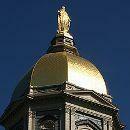GLBTQ club at Notre Dame: How about a Confession Club instead?

Although many faithful Catholics are troubled by the decision, this latest development fits into a long-line of troubling events at Our Lady's campus. Remember Obama's visit? Indeed, the “pastoral" nature of the new organization appears to be a matter of semantics rather than substance, as students, faculty, and the administration at Notre Dame have been allowing pro-homosexual activism on campus for years.
The Progressive Student Union, an officially recognized leftist student group, already has a pro-homosexual campaign called “The 4 to 5 Project.” Notre Dame student Alex Coccia, a leader of the group, even promotes same-sex “marriage.”
Faculty and students have petitioned the administration for an “official” homosexual club since 1986,1 and have been actively campaigning to add “sexual orientation” to the university’s non-discrimination policy. In 1996, the university created the “Standing Committee on Gay and Lesbian Student Needs,” later renamed the “Core Committee on Gay and Lesbian Student Needs.”
The Committee is an entity within the Office of Student Affairs created to promote the acceptance of homosexuality on campus. Over the years, it has participated in “National Coming Out Day,” hosted a “Queer Film Festival,” and organized the annual “StaND Against Hate Week.” The latter was sponsored not only by the Core Council and Office of Student Affairs, but also the Gender Relations Center, Student Government, Campus Ministry, and the Office of the President.
Notre Dame’s latest decision, however, cannot be understood outside the context of a greater anti-family movement. In the words of homosexual activist Paul Varnell, the movement “whether we acknowledge it or not, it is not a civil rights movement, not even a sexual liberation movement, but a moral revolution aimed at changing people’s view of homosexuality.”2
The creation of pro-homosexual clubs on Catholic campuses is the vanguard of this moral revolution. They are often a first step in propagandizing America’s youth into accepting the homosexual lifestyle. The homosexual activist groups GLSEN (Gay, Lesbian, and Straight Education Network) has helped establish more than 4,000 “Gay-Straight Alliances” at K-12 schools and universities across the country. Sadly, research shows that 52% of Catholic colleges and universities in America allow pro-homosexual clubs on campus.
Some claim that these clubs are not tools of the sexual revolution, and that some clubs are faithful to the traditional moral teachings of the Catholic Church. Perhaps. But asking the following questions can shed light on the true nature of the club.
- Does the club explicitly or implicitly deny that homosexual acts are sinful?
- Does the club voice disdain or antipathy towards anyone who doesn’t?
- Does the club use the same slogans and language coined by the homosexual movement itself, such as “homophobia,” “safe space,” “bullying,” “intolerance,” “hate,” and “ally?”
- Does the club participate in events sponsored by pro-homosexual organizations, such as the annual “Day of Silence” in April and “National Coming Out Day” on October 11?
If the answer to any of these questions is “yes,” then the club is almost certainly in the wrong camp. It is naïve at best to think that a club on a Catholic campus that looks, acts, and sounds exactly like activist pro-homosexual clubs on secular campuses is dedicated to anything less than the same goal.
In Notre Dame’s case, the reaction of pro-homosexual groups was very indicative: they celebrated. New Ways Ministry, for example, a “Catholic” pro-homosexual organization that already had Notre Dame listed on their website as a “gay-friendly campus,”3celebrated on their blog: “As the struggle for recognition, protection, and equality at the University of Notre Dame continues through the devoted efforts of students and faculty, New Ways Ministry commends the progress already made by these visionary young adults and their older mentors.”4 Campus Pride stated that “it is undeniable that progress is being made on religiously-affiliated campuses across the country.”5
At the same time that Notre Dame approved its new student organization, the Catholic University of America announced it was rejecting a very similar proposal, expressing concern that it “might become an advocacy organization.” The decision was criticized by Campus Pride, the left-leaning National Catholic Reporter, and other pro-homosexual outlets.
Any club that promotes the acceptance of a sinful lifestyle could be compared morally to a “meth club,” “marijuana club,” "adultery club," or a "drunkards club." It only affirms self-destructive behavior. If you celebrate your friend’s drug addiction, tell him he was “born that way,” and that he cannot and should not change his lifestyle, can you truly say you love him?
St. Thomas Aquinas teaches that one of the spiritual works of mercy is to “admonish the sinner.” Just as true charity entails kindly telling the drug user to stop his habit, so too must we admonish the unfortunate souls who have fallen into homosexual vice and help them abandon the sinful lifestyle.
We must love the sinner, and hate the sin. The only legitimate club for sinners is the Confession club. Or something analogous to Courage, a Catholic organization that assists people tempted by unnatural vice. It must teach students that sin is sin and temptations must be overcome through the power of grace, the Sacraments, prayer, and good counsel. Anything less will only lead us further down the slippery slope.

